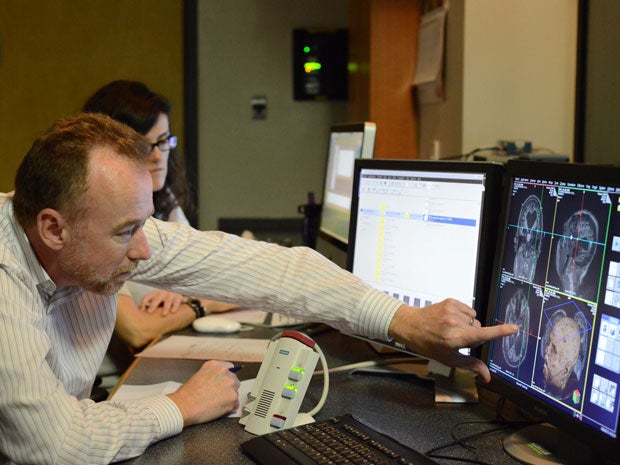Unlocked: Man believed to have been in a vegetative state for more than 10 years answers questions and tells scientists he is not in pain

A man who was believed to have been in a vegetative state for more than a decade has been able to answer questions from scientists and tell them he was not in any pain.
It is the first time that a person believed to be lacking all awareness has been able to communicate information relevant to their medical condition.
The breakthrough was achieved by Professor Adrian Owen, a British neuroscientist, who developed a technique for reading the minds of people who were in a vegetative state almost three years ago.
Using an advanced MRI brain scanner he and his team from Cambridge University were able to show that the patients were thinking, and could interact with them obtaining “yes” and “no” answers to questions, even though it was impossible to establish communication at the bedside.
The findings were published in the New England Journal of Medicine in 2010 and were hailed by experts who said they would have “a profound impact across medicine.”
Professor Owen moved to Canada later in 2010 to pursue his research at the Brain and Mind Institute, Western Ontario where he investigated the case of Scott Routley, from London, Ontario, who was believed to have been in a vegetative state for 12 years following a traumatic collision with a police car at a cross roads.
Although his eyes were open and he followed the normal sleep/wake cycle, all the conventional tests on Mr Routley, using visual, auditory, tactile or noxious stimuli, elicited no response suggesting he was vegetative.
However, his parents had always thought he was conscious and could communicate by lifting his thumb or moving his eyes but this was never accepted by medical staff.
Using the technique he developed in Cambridge, Professor Owen tested whether Mr Routley had any awareness by giving him instructions and monitoring his brain activity on the brain scanner.
The technique involved asking Mr Routley questions and getting him to imagine one of two scenarios depending on whether the answer was yes or no. The two scenarios were playing a game of tennis and walking through his home. They triggered patterns of activity in different parts of the brain which were mapped by the scanner, allowing the scientists to communicate with him.
Professor Owen told the BBC Panorama programme: ““Scott has been able to show he has a conscious, thinking mind. We have scanned him several times and his pattern of brain activity shows he is clearly choosing to answer our questions. We believe he knows who and where he is.”
“Asking a patient something important to them has been our aim for many years. In future we could ask what we could do to improve their quality of life. It could be simple things like the entertainment we provide or the times of day they are washed and fed.”
Professor Owen said he had tested many vegetative patients and in most it had not proved possible to show they were conscious. “But when we see it we are prepared to put our money where our mouths are and say, yes, these patients are conscious and they are communicating.”
Professor Bryan Young of University Hospital in London, Ontario, who has been Scott’s neurologist for a decade, said the scan results overturned all the behavioural assessments that had been made over the years.
“He had the clinical picture of a typical vegetative patient – no emotional response, no fixation or following with his eyes. He didn’t have any spontaneous movements that looked meaningful and I was quite impressed and amazed that he was able to show these cognitive responses with [the brain scanner].”
The Mind Reader: Unlocking my Voice, Panorama, BBC One, 10.35pm
Subscribe to Independent Premium to bookmark this article
Want to bookmark your favourite articles and stories to read or reference later? Start your Independent Premium subscription today.

Join our commenting forum
Join thought-provoking conversations, follow other Independent readers and see their replies